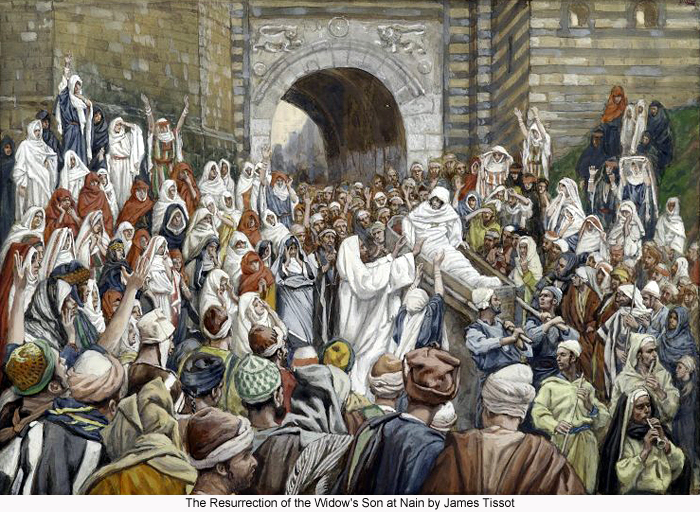"Soon afterward, Jesus went to a town called Nain, and His disciples and a large crowd was with Him." (Luke 7:11 NIV)
Cain means lovely, beauty and pleasantness, though the town wasn’t feeling it that fateful day. Nain was a beautiful place overtaken by the pain and and sorrow of premature death. Doesn’t that sound familiar? We think of Eden’s eviction and the first family’s murder and even our own sordid story; the garden has been eclipsed by death from the very start.

"As He approached the town gate, a dead person was being carried out - the only son of his mother, and she was a widow. And a large crowd from town was with her." (Luke 7:12 NIV)
These folks were literally bearing death upon their shoulders. They were weighed down by their most recent loss. The widow was burying her only son and she was evidently beloved enough to that the whole town came out in support. How her hopes had were dashed that day: about to be submerged in the dirt with her now-cold son. We instinctively worry about her provision going forward, but she was likely just grasping for air itself: trying to convince her lungs to keep moving after her son’s had ceased.
It’s notable that Jesus met this sad procession at the city gate. In the ancient near east, city gates were places of legislation. The ruler would sit at the city gate and matters of local law and concern were decided. The city gate was the biblical equivalent of the modern-day courthouse. In this text, the judgement against this community was death, but Jesus entered that gate and changed everything.
"When the Lord saw her, His heart went out to her and He said 'Don't cry.' (Luke 7:13 NIV)
Our Lord was moved with compassion for this woman and her heartbreak. Isn’t it comforting to know He always meets our sorrow with Himself? He meets us in our misery. Will we look up and see Him? Will we acknowledge His presence? Because He is here to turn our funeral procession into a parade of life!
"Then He went up and touched the bier they were carrying him on, and the bearers stood still. He said, "Young man, I say to you, get up! The dead man sat up and began to talk." (Luke 7:14-15 NIV)
I think you know by now that I’m a big believer in reading bible accounts as though we are present in the time they were written. These aren’t dead stories in an old book, but living records of actual people. Pretend for a moment that you are a pall-bearer at this particular funeral:
No death is easy, but a young man’s death is especially heart-breaking. The widowed mother was inconsolable, far too young herself to be this alone in life. As a pall-bearer in this ordeal, it feels terribly final and unfair. You are desperate to be done with your duty. Almost there now – you’ve passed the city gate when there’s a commotion. An oncoming crowd obstructs the path to the burial place. The parade of death pauses and you feel the weight of the dead boy dig into your aching shoulders.
“Don’t cry.” The words to the widowed childless mother drift over the air, feeling wildly inappropriate. You can’t help but sneer, how heartless! this man cannot possibly know how precious this little family is… how it was anyway, to your community. How insensitive. How cruel… Wait, how in the world has He come so close? This man, some sort of Rabbi, is near enough to the basket you are carrying to render himself unclean. He speaks strange words to the dead boy – or maybe it was to you – you’re unsure.
“Young man, I say to you, get up!” He is somehow authoritative and loving at the same time; wielding the tone and affection your father would use to steer you away from danger. Suddenly the weigh shifts in the bier upon your shoulders and you nearly topple from the unexpected nature of it. Dead boys don’t speak but it seems the widow’s deceased son is sitting up and having a conversation with this strange teacher. Good glory, what just happened?
"They were all filled with awe and praised God. "A great prophet has appeared among us." they said, "God has come to help His people." (Luke 7:16 NIV)
This funeral procession in Nain realized in a matter of moments what would take the rest of the nation years to come to terms with. Jesus is the difference between life and death. Nain would once again be restored to it’s namesake: lovely, beauty and pleasantness. The judgement over her citizens was revoked the moment Jesus entered her gates. This was true for Nain and it is true for us. Jesus has interrupted humanity’s funeral procession. He sees our tears and trauma and He steps in to alter the ending altogether.
What about personal application? Where in your life are you expecting death, but Jesus is speaking life? Are you still crying when He has asked you to stop and trust? What might resurrection look like in your modern-day story? Lock eyes with Him and await the next miracle, my friend. He is here. He sees you and knows your sorrow. He still has a plan to turn mourning into dancing.
Lord, we are weighted down by death. We forget that there’s a resurrection coming because so often, all we see and feel is sorrow. Remind us today to stop crying and start trusting. You are here in our story with the power to bring dead things back to life. May we trust You enough to lock eyes and follow instructions in the meantime. Amen.